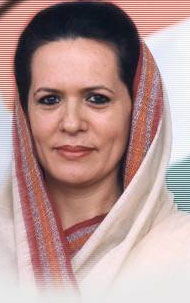Sonia Gandhi
|
|
Sonia Gandhi (सोनिया गाँधी) (born December 9, 1946), is an Italian-born Indian politician, the president of the Indian National Congress (Congress Party) and the widow of former Prime Minister Rajiv Gandhi. She is currently the chairwoman of the ruling United Progressive Alliance in the Lok Sabha.
Early life
Born as Antonia Maino to Stefano and Paola Maino in Orbassano, a town 20 km from Turin, Italy, she spent her adolescence in Orbassano being raised in a conservative Roman Catholic family and attending a Catholic seminary. Her father, a building contractor, died in 1983, but her mother and two sisters still live around Orbassano. While doing a certificate course in English in Cambridge, England (not affliated to the University of Cambridge) she met Rajiv Gandhi, who later became Prime Minister of India. They were married in 1968, after which she took up residence in India. The name Sonia was given by her mother-in-law Indira Gandhi. The couple had two children, Rahul Gandhi (born 1970) and Priyanka Gandhi (born 1971). She adopted Indian citizenship in 1983.
Role in Indian politics
Following her husband's assassination on May 21, 1991, there were calls for her to enter politics by members of the Congress Party, mainly due to the presumption that being led by a member of the Nehru-Gandhi family was an electoral asset for the party. After her refusal, the party settled on the choice of Narasimha Rao as leader and, subsequently, Prime Minister. She finally entered politics just before the 1998 Lok Sabha elections, assuming the helm of the Congress Party. With the charisma of the family name behind her, she was able to draw large crowds and nearly single-handedly revitalized the party. However, her opponents (chiefly the Bharatiya Janata Party) constantly played up the fact of her foreign birth, her declining to take up Indian citizenship for 15 years after her marriage and her lack of fluency in Hindi.
She was elected the Leader of the Opposition of the 13th Lok Sabha in 1999, and in the 2004 election launched an aggressive campaign to unseat the ruling National Democratic Alliance. She had been tipped to be the next Prime Minister of India following her party's surprise victory in the 2004 Lok Sabha election. On May 16 she was unanimously voted to lead a 19-party coalition government which was subsequently named the United Progressive Alliance (UPA).
A storm of controversy emerged following her party's victory, as the possibility of a foreign-born Prime Minister caused many (especially amongst the BJP's supporters) to agitate against Gandhi. Many prominent leaders of the Bharatiya Janata Party, which had been voted out of power in the elections, threatened to launch a nationwide agitation if Sonia became the Prime Minister. They alleged that she was not only a foreigner but also a political novice with no experience in public life. One leader even threatened to shave her head if Gandhi became Prime Minister. However, on May 18, a day before her scheduled inauguration, unleashing a political upheveal among her supporters, she declined the Prime Minister's post, citing personal reasons. This served the twin purpose of robbing the Bharatiya Janata Party of an issue to agitate against the Government and also won her the support and admiration of a number of political leaders and the media. Gandhi renounced the Prime Minister's post and suggested Manmohan Singh for the Prime Minister's post who was eventually accepted by the lawmakers, despite pleas by members of the Congress party for Gandhi to reverse her decision. Gandhi instead took office as the chairperson of the newly formed National Advisory Council with the status of a Cabinet Minister.
Gandhi has authored two books: 'Rajiv' and 'Rajiv’s World'. In addition, she has also edited 'Freedom’s Daughter' and 'Two Alone, Two Together' (two volumes of letters exchanged between Jawaharlal Nehru and Indira Gandhi from 1922 to 1964).

